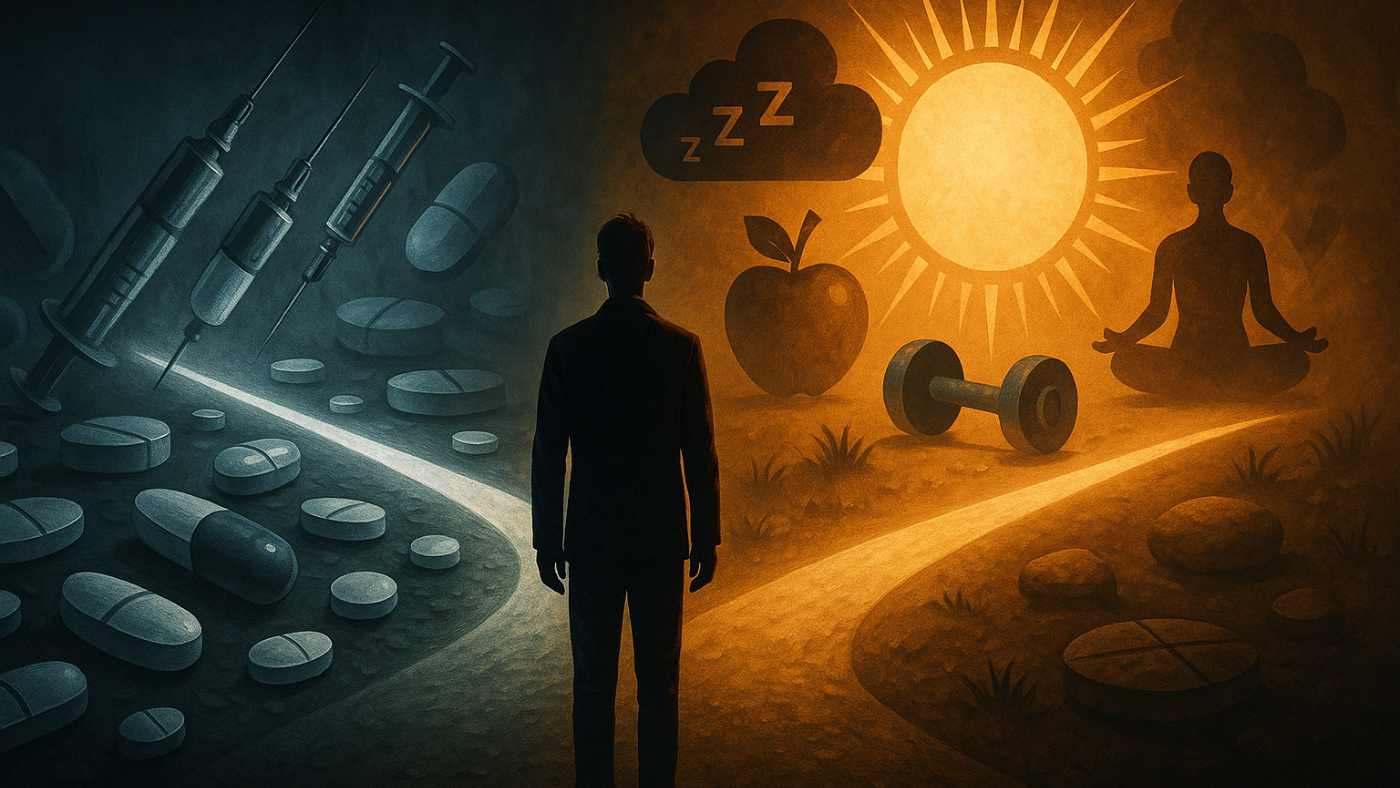
Although synthetic hormones make men anxious, testosterone is essential for men's health.
That’s where natural methods come in, which emphasize lifestyle and dietary factors that encourage healthy testosterone production.
Although there’s no shortage of quick fixes hawked out there, actual hormone balance often boils down to simple, habitual practices.
What can you do to raise the Level of Testosterone Naturally?
Top approaches include sleep, diet, exercise, and stress.
The best natural testosterone booster of all is sleep.
Researchers found that a lack of sleep may soon lead to a decrease in testosterone in men who usually sleep less than six hours per night (1).
Testosterone is at its most productive during deep sleep stages, so rest is integral.
Additionally, testosterone benefits from exercise, particularly high-intensity interval training (HIIT) and strength training (2).
Pushing the heavy iron in compound movements—squats and deadlifts—your endocrine system will fire on all cylinders, and natural hormone production will shoot up.
Diet is another cornerstone. Sufficient protein, good fats, and micronutrients like zinc, vitamin D, and magnesium are all important in the production of testosterone.
Low levels of these nutrients are often responsible for low hormone levels. Some foods, like eggs, fatty fish, nuts, and leafy greens, are especially supportive.
Stress management is ignored a lot of the time, but it’s so important. Testosterone is directly suppressed by cortisol, the stress hormone.
Prolonged stress, be it from work, money, or bad lifestyle habits, can seriously affect testosterone production.
They also mitigate the effect with practices like meditation, yoga, and ample downtime.

The Role of Weight Management
Extra body fat, especially visceral fat, causes the body to produce estrogen, which then lowers testosterone.
Dieting and exercise as a process of losing weight not only contribute to keeping fit, but they also help to build a healthy hormonal balance (3).
Avoiding Testosterone Killers
Overconsumption of alcohol, smoking, a poor diet, and inactivity are all testosterone killers.
Guys who wish to (naturally) upgrade to Version 2.0 should be aware that even everyday habits—such as eating too much sugar, or sitting for the majority of the day—can gradually erode hormone health.
The Supplement Debate
Lifestyle is the bedrock, but some supplements may help testosterone along.
Studies have had promising results with vitamin D, zinc, magnesium, and ashwagandha.
But men should be wary and prioritize addressing sleep, diet, and stress before turning to pills.
Will Naturals Be Able to Compete with Therapy?
Synthetic hormone Makeup can give you instant results, but they do not offer long-term benefits in natural ways.
As for the average person, making certain positive lifestyle changes alone may have dramatic effects on T levels, especially for those with levels barely this side of low, and may obviate the need for medical treatment.
To Summarize
Increasing Testosterone Naturally. It's not about quick fixes, but it is about setting up the right environment for your body's success. Focusing on sleep, diet, exercise, and managing stress can enhance testosterone levels naturally, without offering the same risks as plastic treatments do.
💥Begin your natural testosterone journey - better health starts with small habits every day 💥
FAQs on Increasing Testosterone Naturally
Can natural methods boost your testosterone as much as therapy?
For mild to moderate cases, yes. Prospective implications: Severe deficiencies may still need treatment.
How long after does the natural way take to grow?
Continued lifestyle modifications may show effects within 8–12 weeks.
Do supplements, such as testosterone boosters, work for increasing testosterone?
Most so-called boosters are worthless, but nutrients like vitamin D and zinc may be the exception if you’re deficient.
Is it actually true that losing weight boosts testosterone?
Yes, you balance the ratio of estrogen-producing androgen-producing fat cells and encourage your body to produce more on its own.
To what extent does sleep affect testosterone?
A week of bad sleep can cut testosterone levels by 10–15 per cent.
Related Studies
1. Title: Effect of 1 Week of Sleep Restriction on Testosterone Levels in Young Healthy Men
In healthy young men, restricting sleep to ~5 hours/night for one week reduced daytime testosterone by about 10–15%.
DOI: https://doi.org/10.1001/jama.2011.829
2. Title: The Effect of High-Intensity Interval Training Periods on Morning Serum Testosterone and Cortisol Levels and Physical Fitness in Men Aged 35–40 Years
In a randomized, controlled trial, HIIT significantly increased morning testosterone versus control while improving fitness.
DOI: https://doi.org/10.3390/healthcare9050512
3. Title: Effect of Vitamin D Supplementation on Testosterone Levels in Men (Randomized, double-blind, placebo-controlled)
In vitamin-D-deficient, overweight men, vitamin D (3,332 IU/day for 12 months) increased total, bioactive, and free testosterone versus placebo.
DOI: https://doi.org/10.1055/s-0030-1269854






